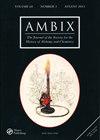A Cultural History of Chemistry in the Modern Age (vol. 6)
IF 0.6
3区 哲学
Q3 HISTORY & PHILOSOPHY OF SCIENCE
引用次数: 0
Abstract
A Cultural History of Chemistry in the Modern Age covers the period from 1914 to the present. The impact of chemistry and the chemical industry on science, war, society, and the economy has made this era the “Chemical Age”. Having prospered in the West, chemical science spread across the globe and slowly became more diversified in terms of its ethnic and gendered mix. After flourishing for sixty years, the chemical industry was impacted by the Oil Crisis of the 1970s and became almost invisible in the West. While the industry has clearly delivered many benefits to society—such as new materials and better drugs—it has been excoriated by critics for its impact on the environment. The 6 volume set of the Cultural History of Chemistry presents the first comprehensive history from the Bronze Age to today, covering all forms and aspects of chemistry and its ever-changing social context. The themes covered in each volume are theory and concepts; practice and experiment; laboratories and technology; culture and science; society and environment; trade and industry; learning and institutions; art and representation.现代化学文化史(第6卷)
《现代化学文化史》涵盖了从1914年到现在的这段时间。化学和化学工业对科学、战争、社会和经济的影响使这个时代成为“化学时代”。在西方繁荣之后,化学科学传播到全球,慢慢地在种族和性别混合方面变得更加多样化。在繁荣了60年之后,化学工业受到了20世纪70年代石油危机的影响,在西方几乎被忽视了。虽然制药行业显然为社会带来了许多好处——比如新材料和更好的药物——但它却因其对环境的影响而受到批评。6卷集的化学文化史呈现了从青铜时代到今天的第一个全面的历史,涵盖了化学的所有形式和方面及其不断变化的社会背景。每卷涵盖的主题是理论和概念;实践与实验;实验室和技术;文化与科学;社会与环境;贸易和工业;学习和制度;艺术和表现。
本文章由计算机程序翻译,如有差异,请以英文原文为准。
求助全文
约1分钟内获得全文
求助全文
来源期刊

Ambix
HISTORY & PHILOSOPHY OF SCIENCE-
CiteScore
0.80
自引率
60.00%
发文量
42
审稿时长
3 months
期刊介绍:
Ambix is an internationally recognised, peer-reviewed quarterly journal devoted to publishing high-quality, original research and book reviews in the intellectual, social and cultural history of alchemy and chemistry. It publishes studies, discussions, and primary sources relevant to the historical experience of all areas related to alchemy and chemistry covering all periods (ancient to modern) and geographical regions. Ambix publishes individual papers, focused thematic sections and larger special issues (either single or double and usually guest-edited). Topics covered by Ambix include, but are not limited to, interactions between alchemy and chemistry and other disciplines; chemical medicine and pharmacy; molecular sciences; practices allied to material, instrumental, institutional and visual cultures; environmental chemistry; the chemical industry; the appearance of alchemy and chemistry within popular culture; biographical and historiographical studies; and the study of issues related to gender, race, and colonial experience within the context of chemistry.
 求助内容:
求助内容: 应助结果提醒方式:
应助结果提醒方式:


